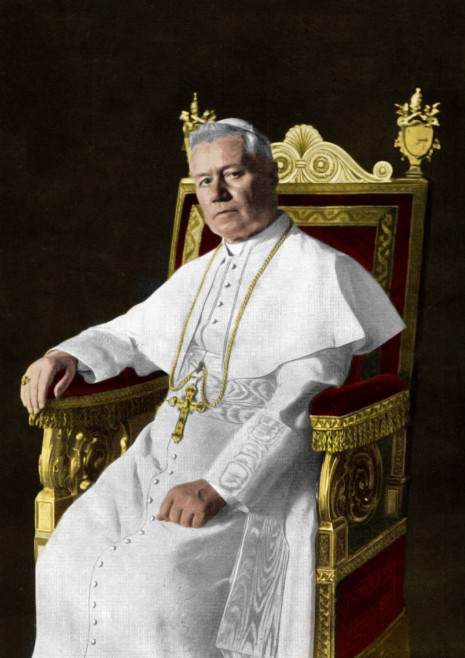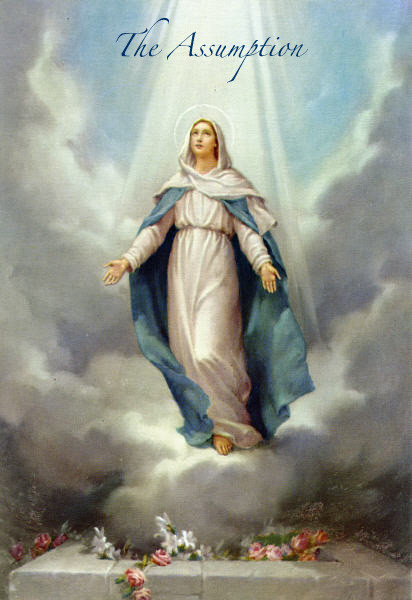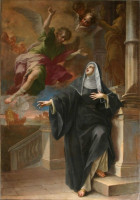St. Monica Mother of St. Augustine
FROM THE CONFESSIONS OF ST AUGUSTINE
LET US GAIN ETERNAL WISDOM
Because the day when she was to leave this life was drawing near – a day known to you, though we were ignorant of it – she and I happened to be alone, through (as I believe) the mysterious workings of your will. We stood leaning against a window which looked out on a garden within the house where we were staying, at Ostia on the Tiber; for there, far from the crowds, we were recruiting our strength after the long journey, in order to prepare ourselves for our voyage overseas. We were alone, conferring very intimately. Forgetting what lay in the past, and stretching out to what was ahead, we enquired between ourselves, in the light of present truth, into what you are and what the eternal life of the saints would be like, for Eye has not seen nor ear heard nor human heart conceived it. And yet, with the mouth of our hearts wide open we panted thirstily for the celestial streams of your fountain, the fount of life which is with you.
This was the substance of our talk, though not the exact words. Yet you know, O Lord, how on that very day, amid this talk of ours that seemed to make the world with all its charms grow cheap, she said, “For my part, my son, I no longer find pleasure in anything that this life holds. What I am doing here still, or why I am still here, I do not know, for worldly hope has withered away for me. One thing only there was for which I desired to linger in this life: to see you a Catholic Christian before I died. And my God has granted this to me more lavishly than I could have hoped, letting me see even you spurning earthly happiness to be his servant. What am I still doing here?”
What I replied I cannot clearly remember, because just about that time – five days later, or not much more – she took to her bed with fever. One day during her illness she lapsed into unconsciousness and for a short time was unaware of her surroundings. We all came running, but she quickly returned to her senses, and, gazing at me and my brother as we stood there, she asked in puzzlement, “Where was I?”
We were bewildered with grief, but she looked keenly at us and said, “You are to bury your mother here”. I was silent, holding back my tears, but my brother said something about his hope that she would not die far from home but in her own country, for that would be a happier way. On hearing this she looked anxious and her eyes rebuked him for thinking so; then she turned her gaze from him to me and said, “What silly talk!” Shortly afterwards, addressing us both, she said, “Lay this body anywhere, and take no trouble over it. One thing only do I ask of you, that you remember me at the altar of the Lord wherever you may be”. Having made her meaning clear to us with such words as she could muster, she fell silent, and the pain of the disease grew worse.
Psalm Song of the Church
Psalm Song of the Church
From the apostolic constitution
Divino afflatu (By Divine Inspiration) of Saint Pius X, pope
The song of the Church
The collection of psalms found in Scripture, composed as it was under divine inspiration, has, from the very beginnings of the Church, shown a wonderful power of fostering devotion among Christians as they offer to God a continuous sacrifice of praise, the harvest of lips blessing his name. Following a custom already established in the Old Law, the psalms have played a conspicuous part in the sacred liturgy itself, and in the divine office. Thus was born what Basil calls the voice of the Church, that singing of psalms, which is the daughter of that hymn of praise (to use the words of our predecessor, Urban VIII) which goes up unceasingly before the throne of God and of the Lamb, and which teaches those especially charged with the duty of divine worship, as Athanasius says, the way to praise God, and the fitting words in which to bless him. Augustine expresses this well when he says: God praised himself so that man might give him fitting praise; because God chose to praise himself man found the way in which to bless God.
The psalms have also a wonderful power to awaken in our hearts the desire for every virtue. Athanasius says: Though all Scripture, both old and new, is divinely inspired and has its use in teaching, as we read in Scripture itself, yet the Book of Psalms, like a garden enclosing the fruits of all the other books, produces its fruits in song, and in the process of singing brings forth its own special fruits to take their place beside them.
In the same place Athanasius rightly adds: The psalms seem to me to be like a mirror, in which the person using them can see himself, and the stirrings of his own heart; he can recite them against the background of his own emotions. Augustine says in his Confessions: How I wept when I heard your hymns and canticles, being deeply moved by the sweet singing of your Church. Those voices flowed into my ears, truth filtered into my heart, and from my heart surged waves of devotion. Tears ran down, and I was happy in my tears.
Indeed, who could fail to be moved by those many passages in the psalms which set forth so profoundly the infinite majesty of God, his omnipotence, his justice and goodness and clemency, too deep for words, and all the other infinite qualities of his that deserve our praise? Who could fail to be roused to the same emotions by the prayers of thanksgiving to God for blessings received, by the petitions, so humble and confident, for blessings still awaited, by the cries of a soul in sorrow for sin committed? Who would not be fired with love as he looks on the likeness of Christ, the redeemer, here so lovingly foretold? His was the voice Augustine heard in every psalm, the voice of praise, of suffering, of joyful expectation, of present distress.

Assumption of the Blessed Virgin Mary
Solemnity of the Assumption of the Blessed Virgin Mary
As you know, millions of Rosaries are prayed these days and if you can pray the Rosary with your family, your intentions will be assured because Mary will always listen to us and Jesus God will and can never ignore His Mother's Demands. So, please, pray the rosary when you can and teach your children how to pray the rosary.
The Apostolic Constitution of Pope Pius XII on the Assumption of the Blessed Virgin Mary
YOUR BODY IS HOLY AND GLORIOUS
In their sermons and speeches on the feast day of the Assumption of the Mother of God, the holy fathers and the great doctors of the church were speaking of something that the faithful already knew and accepted: all they did was to bring it out into the open, to explain its meaning and substance in other terms. Above all, they made it most clear that this feast commemorated not merely the fact that the blessed Virgin Mary did not experience bodily decay, but also her triumph over death and her heavenly glory, following the example of her only Son, Jesus Christ.
Thus St John Damascene, who is the greatest exponent of this tradition, compares the bodily Assumption of the revered Mother of God with her other gifts and privileges: It was right that she who had kept her virginity unimpaired through the process of giving birth should have kept her body without decay through death. It was right that she who had given her Creator, as a child, a place at her breast should be given a place in the dwelling-place of her God. It was right that the bride espoused by the Father should dwell in the heavenly bridal chamber. It was right that she who had gazed on her Son on the cross, her heart pierced at that moment by the sword of sorrow that she had escaped at his birth, should now gaze on him seated with his Father. It was right that the Mother of God should possess what belongs to her Son and be honored by every creature as God’s Mother and handmaid.
St Germanus of Constantinople considered the preservation from decay of the body of the Mother of God, the Virgin Mary, and its elevation to heaven as being not only appropriate to her Motherhood but also to the peculiar sanctity of its virgin state: It is written, that you appear in beauty, and your virginal body is altogether holy, altogether chaste, altogether the dwelling-place of God; from which it follows that it is not in its nature to decay into dust, but that it is transformed, being human, into a glorious and incorruptible life, the same body, living and glorious, unharmed, sharing in perfect life.
Another very ancient author asserts: Being the most glorious Mother of Christ our savior and our God, the giver of life and immortality, she is given life by him and shares bodily incorruptibility for all eternity with him who raised her from the grave and drew her up to him in a way that only he can understand.
All that the holy fathers say refers ultimately to Scripture as a foundation, which gives us the vivid image of the great Mother of God as being closely attached to her divine Son and always sharing his lot.
It is important to remember that from the second century onwards the holy fathers have been talking of the Virgin Mary as the new Eve for the new Adam: not equal to him, of course, but closely joined with him in the battle against the enemy, which ended in the triumph over sin and death that had been promised even in Paradise. The glorious resurrection of Christ is essential to this victory and its final prize, but the blessed Virgin’s share in that fight must also have ended in the glorification of her body. For as the Apostle says: When this mortal nature has put on immortality, then the scripture will be fulfilled that says, “Death is swallowed up in victory”.
So then, the great Mother of God, so mysteriously united to Jesus Christ from all eternity by the same decree of predestination, immaculately conceived, an intact virgin throughout her divine motherhood, a noble associate of our Redeemer as he defeated sin and its consequences, received, as it were, the final crowning privilege of being preserved from the corruption of the grave and, following her Son in his victory over death, was brought, body and soul, to the highest glory of heaven, to shine as Queen at the right hand of that same Son, the immortal King of Ages.
Let us pray.
Almighty, ever-living God, you have taken the mother of your Son,
the immaculate Virgin Mary, body and soul into the glory where you dwell. Keep our hearts set on heaven so that, with her, we may share in your glory. Through our Lord Jesus Christ, your Son,
who lives and reigns with you in the unity of the Holy Spirit,
one God, for ever and ever. Amen.
Hail Mary …….. . In the name of the Father ……. Amen.



